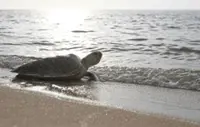Reef rescue: Divers removing discarded fishing nets from a coral reef in Sabah’s waters.
KOTA KINABALU: Seabed pollution of discarded fishing nets continues to plague islands and waters in Sabah, prompting groups to step up removal efforts of this ecosystem-destroying debris.
Among the recent operations involved divers at the Tunku Abdul Rahman Park, not far from the state capital, where over 140kg of discarded fishing nets were removed.





